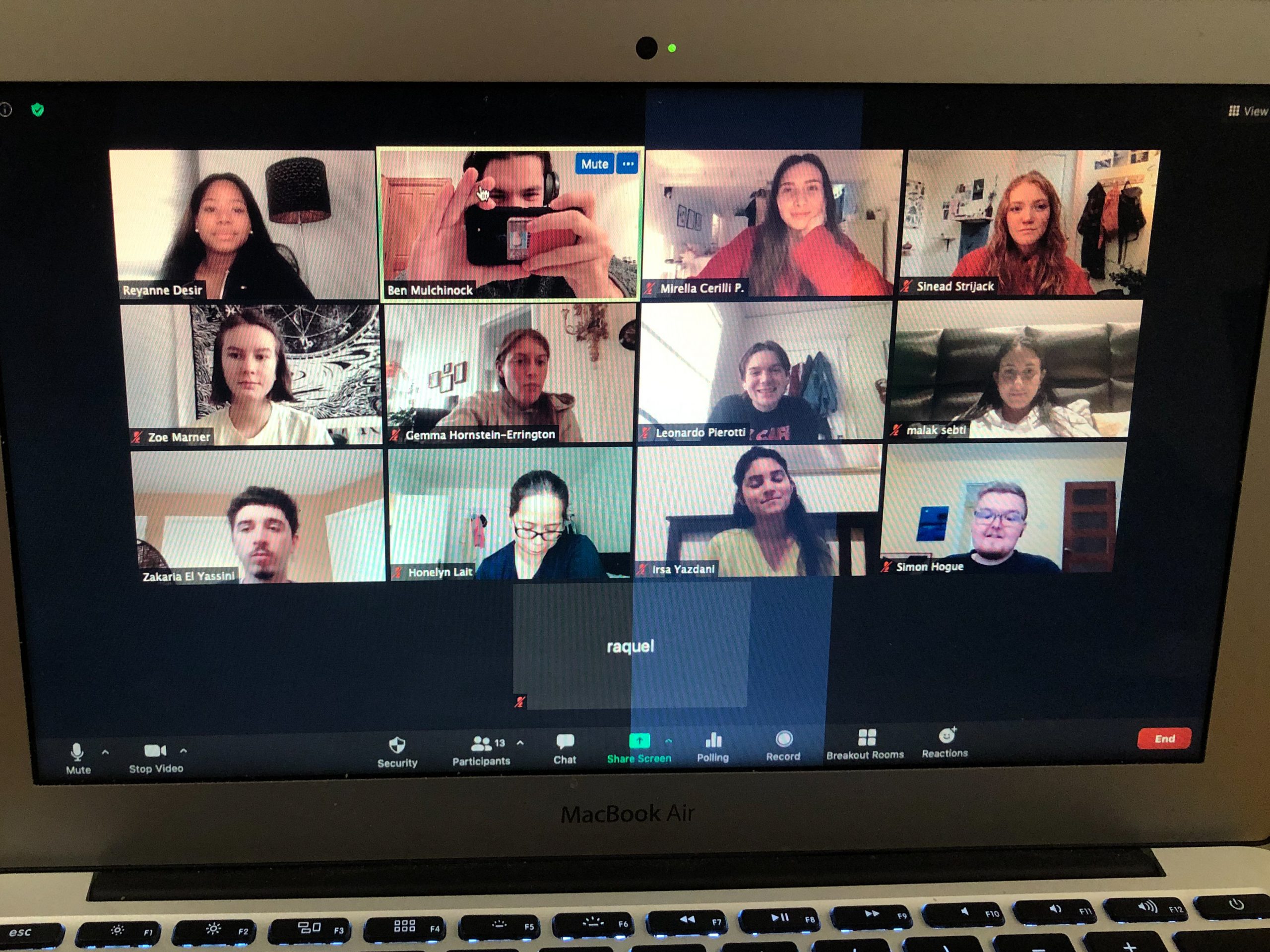War has been an integral part of human history. For as long as humans have been walking the earth, we have been engaged in strategic and often savage killing of each other. Invading armies have been responsible for mass killings, torture, rape, and other extreme human rights abuses. So, why do we war? Is war strictly a human characteristic?
“Very few animals actually fight each other to the death,” says Joanna Bottenberg Ph.D., a professor at Concordia who teaches a class, Approaches to War and Peace.
“Aggression usually goes to a certain point with many animals and then there is a backing off. It seems like our species has been cheated out of the ability to be able to back off. That’s why we regularly kill each other in very large numbers.”
Between 30 and 60 million people died during the Mongol Conquests, and 25 million were reportedly killed during the Manchu conquest of Ming China. Sixty to 72 million people died in the Second World War, the world’s most devastating war.
The problem is not only that we kill in large numbers; it is also that we kill often. In War Before Civilization, Lawrence H. Keeley, a professor at the University in Illinois, wrote that approximately 90 to 95 per cent of known societies throughout history have engaged in warfare.
So why do humans engage in this destructive behaviour? According to anthropologists, the reasons are varied and complicated. They say that horticulture, high population densities and the development of weapons are definite factors for why we war. Until about the mid-twentieth century most theorists and researchers believed that war was a unique to humans and closely connected with the development of plant cultivation, complex human social structures and technological advancements.
However, during the early seventies, a series of studies revealed shocking evidence- our closest relatives, the chimpanzees, often engage in vicious deadly group raids. In early 1974, Dr. Jane Goodall witnessed and documented the “four-year war.” While in Africa studying chimpanzee behaviour, she discovered they “engage in a primitive form of brutal warfare.” It was the first-ever recorded episode of long-term warfare of non-human primates.
Goodall recorded a split between a group of chimpanzees and the ensuing slaughter of every male and some females of the weaker group. In the four-year period “Members of the ‘Kasakela’ group,” she wrote, “systematically annihilated members of the ‘Kahama’ splinter group.”
After Goodall’s discovery, focus on chimpanzees increased. A growing number of studies later discovered that animals use aggression strategically. An interesting hypothesis was developed by Richard W. Wrangham, researcher and professor of anthropology at Harvard University, called “The imbalance-of-power”. He draws attention to the costs, rather than the benefits, of aggression. Wrangham wrote that when the benefits are likely to outweigh the costs of aggression, the chimpanzees act.
“The imbalance-of-power hypothesis proposes that in chimpanzees fission-fusion social structure, combined with coalition bonds among males, creates opportunities for low-cost killing of rivals,” he writes.
Chimpanzees have a tendency to identify strongly with their group. They usually travel in parties that vary in size and strength. This determines the outcome of encounters with other neighbouring chimpanzees. If members of a larger group encounter a smaller group, they kill them. They kill the neighbouring clan because of a very low risk of injury to themselves.
The imbalance-of-power hypothesis argues that “intergroup attacks are lethal not because of unusually high benefits to be obtained from killing, but because the costs of killing are low during gang attacks.” As a result, the killings reduce the coalition strength of rival communities and improve chances for more frequent success in future battles. Territory is gained and with it, more food for the winning group, including females and offspring.
Here, it is suggested that natural selection has preferred a specific type of motivational system. Reproduction is limited by a group’s resources, which are, in turn limited by territory size. The more passive, less calculating group dies off and the aggressive chimpanzees gain land, food, and raise healthier children, whom they train for future battles. Groups selected for survival, whenever the costs are sufficiently low, kill neighbouring groups.
From this, we can extend the analysis to include humans. Although Human warfare is a more complex endeavour, the imbalance-of-power hypothesis is still a useful tool to analyze our state of perpetual war.
When applied to humans the imbalance-of-power hypothesis states that evolution favored humans that warred when the cost of killing was low. Humans with this type of motivational system killed off the more passive, less calculating group.
Humans that were inherently violent gained land, food, and raised healthier children. Many psychologists support the idea that human beings are inherently violent. E.F.M. Durban and John Bowlby, for example, argue that in normal societies, our violent tendency is repressed. However, they say it still needs an outlet that is sometimes provided by war.
“Even in societies that seem peaceful, there is a certain amount of warfare that goes on,” says war historian and Concordia journalism professor, Mark Bourrie.
“In urban society, there are gangs, there are people that band together to fight. It is something that is not expunged from civilization.” According to Bourrie, males of like social class and education band together as they find outlets. The coalitionary bonds among males are seen today in the army, in gangs, in business and in sports-all outlets used to channel aggression.
Early nineteenth century philosopher Richard Whately made an important contribution to the analysis of these coalition bonds. He called it “party feeling,” and described it as the tendency to identify strongly with a group. Whately believed that party feeling made governments possible, but it was also the cause of “most gigantic wars.”
The desire of taking the lead; the desire for excitement; love of disputation; and the ego-gratification that accompanies victory over ones opponent are the most destructive components of party feeling. These components greatly increase the chances that a spiral of violence will erupt. Excessive party feeling makes people lose their sense of proportion, he argued.
“But today war is certainly something that societies loathe to embark on,” says Bourrie. “Especially when they are faced with an opponent that could fight back. There is nothing that France has that would ever warrant the British destroying Paris.”
According to Bourrie, because France and England are both armed with nuclear weapons, the cost of war would greatly outweigh any benefits because of Mutually Assured Destruction (MAD). That is why it is very unlikely that two western powers will ever go to war with each other again.
However, that does not signal an end to all wars. The British might feel strongly enough about something the Saudis have done that they may destroy Jeddah, or the Americans might one day destroy Tehran because the cost is low.
Will we ever see the end of war? According to Bourrie, a real threat to world piece today is religious fundamentalism. “People get the idea that they need not worry about the here and now because there is some sort of wonderful reward waiting for them, and that is the oldest con in the book. That is why fundamentalism is scary and very destabilizing.”
Indeed, the excessive party feeling that accompanies religious fundamentalism today makes people lose their sense of proportion. Suicide bombers kill women and children because they are promised eternal happiness; settlers in the West Bank move into Palestinian territory displacing thousands because ‘God’ promised them that land 2,000 years ago; and millions of Christian fundamentalists in the United States advocate the expulsion of all Palestinians from the West Bank and the Gaza Strip, not because they support one party over the other, but because they believe once Jews inhabit the area, Armageddon will follow, and all Christians will be rewarded in heaven. The Jews, Muslims, Hindus and Buddhists will be locked out, unless, of course, they convert in time.
“I think education and prosperity are antidotes to warfare,” says Bourrie. “We would see the end of war only if every society had more to gain from maintaining a peaceful state of affairs.
And if we value our children enough to educate them, we are not going to throw their lives away.
Master your Photo Skills with the Concordian
Photography is as easy as one, two, three! Are you ready to switch out the average camera on…



